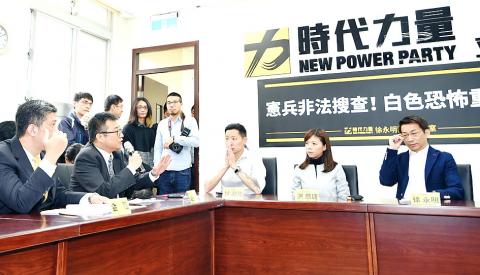Legislators from across party lines yesterday blasted the Taipei Military Police for confiscating White Terror era-related documents seized in a search of a civilian’s residence.
The Legislative Yuan’s Foreign and National Defense Committee put aside its scheduled agenda to question officials over the affair, passed resolutions condemning the military police’s actions and demanded the preservation of all documents relating to the White Terror era.
“[The documents] were not classified and had already become historical documents,” Chinese Nationalist Party (KMT) Legislator Johnny Chiang (江啟臣) said, questioning whether their presence on an online auctioning site was urgent enough to justify military police acting directly instead of referring the case to a public prosecutor.

Photo: Fang Pin-chao, Taipei Times
“Even if investigations are allowed to be conducted without the permission of a prosecutor, personnel from the Ministry of Defense should not have gone with the military police to meet the suspect because they are not ‘judicial police,’” he said, adding that it appeared that the military police had abandoned their neutrality and followed ministry orders.
“The reason this has become such a huge issue is that a judicial and human rights red line has been crossed,” Democratic Progressive Party (DPP) Legislator Lo Chih-cheng (羅致政) said.
The ministry conducted a “scam operation” by pretending to want to purchase tea to “fish out” the man who posted the documents, Lo said, questioning whether the man had willingly assented to the military police searching his home.
Minister of Defense Kao Kuang-chi (高廣圻) apologized for the fear and controversy caused by the incident in response to demands from DPP Legislator Lu Sun-ling (呂孫綾) that he do so.
However, he denied that the ministry regularly monitors local Web sites and said that there had been no other similar incidents.
Numerous legislators demanded that all video footage of the encounter between the military police and the suspect, surnamed Wei (魏), and the documents be preserved and released to the public.
New Power Party (NPP) Legislator Freddy Lim (林昶佐) said the incident showed that the government was keeping tabs on its own citizens.
“There is no way I can believe the Ministry of Defense statements that personnel ‘just happened’ to see the documents,” he said. “The reason they saw them was not because ministry personnel were surfing the Internet at work and went to an auction site to make a purchase.”
At a news conference, other NPP legislators said they were shocked by the involvement of intelligence personnel in directing the military police’s response, calling for reforms to be enacted that would clearly define the military police’s powers.
“This is not just rash behavior by the military police — there is an intelligence organization that regularly monitors online activity and sends in the military police if it finds something,” NPP Legislator Hsu Yung-ming (徐永明) said after ministry officials refused to say how many ministry employees are responsible for monitoring the Internet.

Taiwan has received more than US$70 million in royalties as of the end of last year from developing the F-16V jet as countries worldwide purchase or upgrade to this popular model, government and military officials said on Saturday. Taiwan funded the development of the F-16V jet and ended up the sole investor as other countries withdrew from the program. Now the F-16V is increasingly popular and countries must pay Taiwan a percentage in royalties when they purchase new F-16V aircraft or upgrade older F-16 models. The next five years are expected to be the peak for these royalties, with Taiwan potentially earning

STAY IN YOUR LANE: As the US and Israel attack Iran, the ministry has warned China not to overstep by including Taiwanese citizens in its evacuation orders The Ministry of Foreign Affairs (MOFA) yesterday rebuked a statement by China’s embassy in Israel that it would evacuate Taiwanese holders of Chinese travel documents from Israel amid the latter’s escalating conflict with Iran. Tensions have risen across the Middle East in the wake of US and Israeli airstrikes on Iran beginning Saturday. China subsequently issued an evacuation notice for its citizens. In a news release, the Chinese embassy in Israel said holders of “Taiwan compatriot permits (台胞證)” issued to Taiwanese nationals by Chinese authorities for travel to China — could register for evacuation to Egypt. In Taipei, the ministry yesterday said Taiwan

Taiwan is awaiting official notification from the US regarding the status of the Agreement on Reciprocal Trade (ART) after the US Supreme Court ruled US President Donald Trump's global tariffs unconstitutional. Speaking to reporters before a legislative hearing today, Premier Cho Jung-tai (卓榮泰) said that Taiwan's negotiation team remains focused on ensuring that the bilateral trade deal remains intact despite the legal challenge to Trump's tariff policy. "The US has pledged to notify its trade partners once the subsequent administrative and legal processes are finalized, and that certainly includes Taiwan," Cho said when asked about opposition parties’ doubts that the ART was

If China chose to invade Taiwan tomorrow, it would only have to sever three undersea fiber-optic cable clusters to cause a data blackout, Jason Hsu (許毓仁), a senior fellow at the Hudson Institute and former Chinese Nationalist Party (KMT) legislator, told a US security panel yesterday. In a Taiwan contingency, cable disruption would be one of the earliest preinvasion actions and the signal that escalation had begun, he said, adding that Taiwan’s current cable repair capabilities are insufficient. The US-China Economic and Security Review Commission (USCC) yesterday held a hearing on US-China Competition Under the Sea, with Hsu speaking on